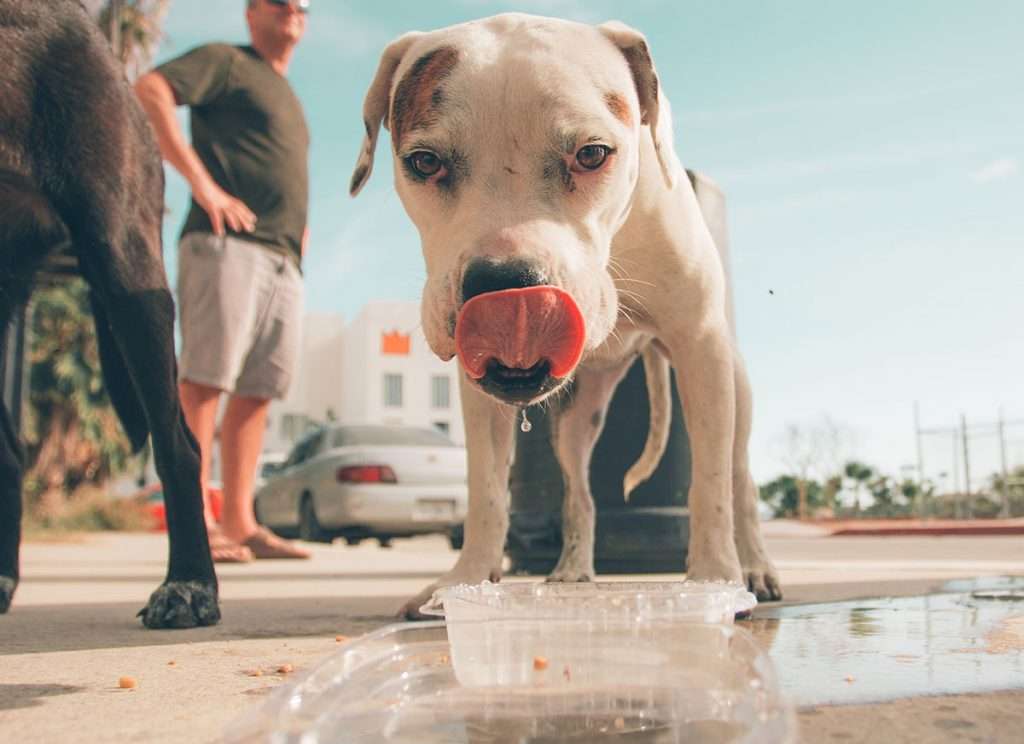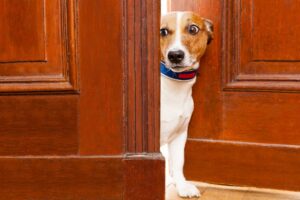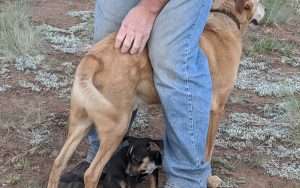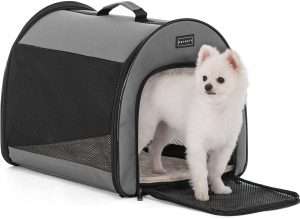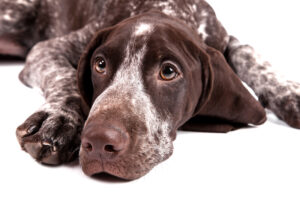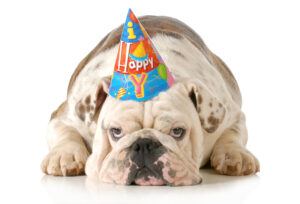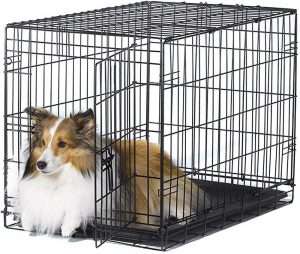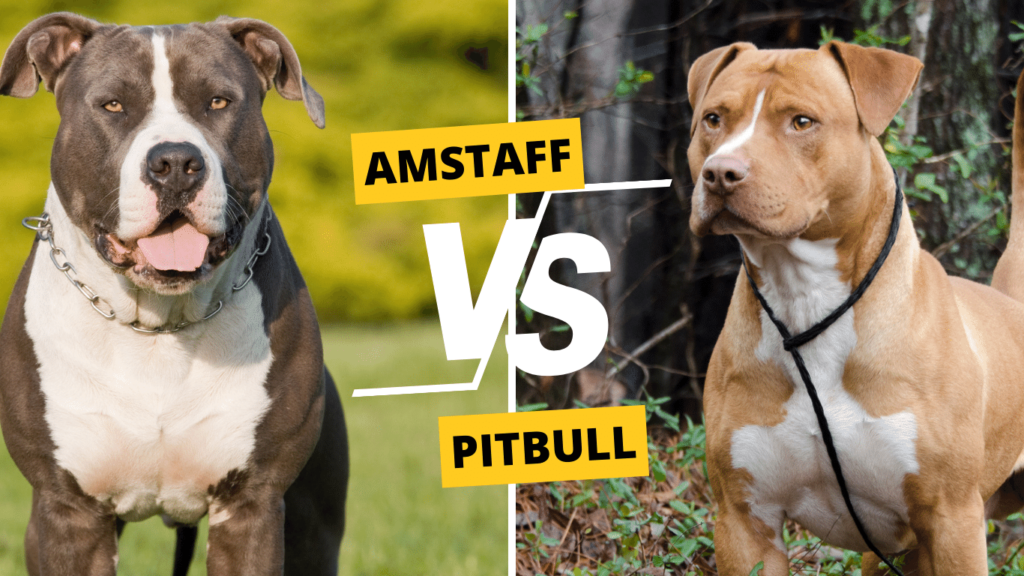
Understanding Puppy Aggressiveness: Causes, Training, and Solutions
-
 By
Victoria Bennett
By
Victoria Bennett
- Last updated: November 1, 2023
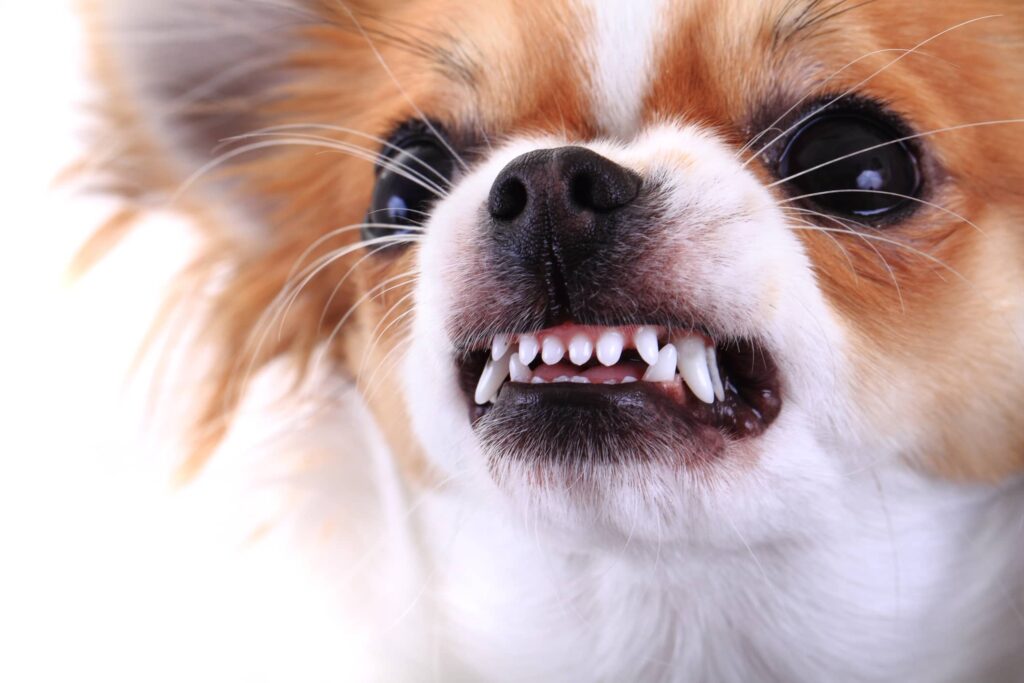
Nothing is more heartwarming than the boundless excitement and joy of a playful puppy. Their unwavering loyalty and playful antics create such a strong emotional connection that it touches our hearts deeply.
However, sometimes, our little friends can surprise us with unexpected bouts of aggression, leaving us feeling worried and unsure of what to do.
Puppy aggressiveness can be concerning and worrying for pet owners, especially when your furry friend starts growling, biting, or guarding their territory. This behavior can often be linked to fear, dominance, or a lack of socialization, and ignoring these signs can be unsafe and hinder your puppy’s well-being.
But don’t worry; we have a solution!
In this comprehensive guide, we will help you understand the causes and types of dog aggression, recognize early signs of puppy aggression, and provide you with effective training techniques, practical solutions, and preventative measures.
By the end of this article, you’ll be equipped to guide your puppy towards a happier, more peaceful coexistence.
Table of Contents
Understanding Puppy Aggression
Puppies are like human babies. They can display a wide range of behaviors, and sometimes, what may seem like aggression is actually just typical puppy behavior. However, it may have an underlying cause!
That’s why it’s important to understand these differences so we can better take care of them and make sure they’re happy.
Here are some types of canine aggression and their causes:
Fear Aggression
Fear aggression is a common behavior among puppies, which is usually triggered by a feeling of anxiety or fear.
It is common for puppies to show fear aggression when they’re approached by strangers, in new or unfamiliar places, or when they feel threatened. But what’s important is to remember that this is a natural behavior and can be addressed with patience and understanding.
Territorial Aggression
When dogs feel like their space is being invaded, they may exhibit signs of a territorial dog by being a little defensive. This can result in territorial puppy aggression towards other dogs or people approaching their safe space.
Defensive Aggression
If puppies feel cornered or trapped, they can sometimes become defensive and display aggression. This behavior is also connected with them feeling threatened or attacked.

Play Aggression
Puppy biting and aggression are quite common in young puppies during play, but it’s usually not because they mean to hurt you. This type of behavior is most common in pups who haven’t yet learned how to control their biting.
Resource Guarding
Sometimes, dogs can become protective of their things like food, toys, and beds. This may lead them to display aggression towards other animals or people who they feel are trying to take their resources away from them. This behavior is commonly known as resource guarding in puppies.
Medically-Induced Aggression
If you notice your puppy growling in sleep, it could be due to certain medical conditions like pain, hypothyroidism, or even brain tumors.
To be safe, it’s always a good idea to take your furry friend for a vet check if you notice any unexplained changes in their behavior.

Causes and Triggers of Puppy Aggression
If an otherwise friendly pup suddenly starts getting aggressive, it can be pretty alarming for the owner.
Usually, signs of aggression in puppies can arise from factors, such as:
- Genetics
- Past experiences
- Health
- Socialization
If a puppy hasn’t been exposed to different situations and people early on, it could also contribute to aggressive behavior.
However, it’s always a good idea to be able to differentiate between a pup’s normal and abnormal behavior.

Difference Between Normal and Abnormal Behavior
If you’re a new puppy owner, it’s important to know how to distinguish between normal puppy behavior and aggression. Puppies are naturally curious and playful, so it’s not uncommon for them to nip or bite during playtime.
However, you should be aware that excessive force or biting outside of playtime may be a sign of aggression.
Some other signs to look out for include:
- Growling
- Snapping
- Baring teeth
- Lunging
- Attacking
If you’re worried that your puppy is displaying aggressive behavior, don’t fret! It’s always best to consult with an online veterinarian or dog trainers for aggression.
They can help you determine the reason behind the aggression and create a plan to address it.

Early Signs of Puppy Aggressiveness
As a responsible dog owner, it’s essential to recognize the early signs of puppy aggressiveness so that you can take proactive measures before the pup harms himself or others around him.
Some of the signs to look for may include:
Growling
If you notice your puppy growling when eating or growling at other dogs or humans, it is a signal that the puppy is feeling threatened or uncomfortable.
Snapping
Snapping is one of the sure shot signs of puppy aggression towards owner, other humans, or animals. It is more serious than growling, as it means that the puppy is prepared to bite.
Baring Teeth
Baring teeth is puppy possessive aggression behavior, which indicates that a puppy is about to lunge at the target. It is often accompanied by growling or snapping.
Body Language
Aggressive puppies may exhibit tense body language, raised fur, or a stiff posture. These cues indicate unease or fear.
Resource Guarding
Resource guarding refers to aggressiveness in dogs when protecting their belongings. Therefore, if you notice food aggression in dogs or toy aggression in dogs, it is basically protective behavior and a clear sign of aggression.
The Role of Genetics and Breeding
Did you know that puppy aggressiveness can also be influenced by genetics? This is why most reputable breeders make sure to breed dogs with stable temperaments to reduce the likelihood of inherited aggression.
But it’s not just about genetics; proper socialization and training are also important for any puppy. So, make sure to give your furry friend lots of love and attention!
Environmental Factors That Can Influence Aggressiveness
Apart from genetics and breeding, another thing that influences puppy aggressiveness is environmental factors. A puppy’s environment can have a big impact on its development.
If they’re not socialized enough or have experienced traumatic events or neglect, you may notice your puppy showing signs of dog aggression towards humans and other dogs.
But don’t worry; there are things you can do to help prevent this!
By providing a loving and stable home, socializing them early, and exposing them to positive experiences, you can help your puppy become a well-adjusted and non-aggressive adult.

Socialization and Aggressiveness
Socializing your puppy is very important for their development. It can have a big impact on their behavior, especially when it comes to preventing aggressive tendencies.
Basically, socialization means exposing your furry friend to lots of different things, like people, animals, environments, and experiences during their early stages. This helps them become more well-adjusted and less likely to act out aggressively.
Plus, socializing your pup helps them have positive interactions, build confidence, and feel less scared. It’s a win-win situation!
How to Socialize an Aggressive Dog
If you’re wondering how to stop aggressive behavior in puppies, socialization is key!
It’s all about showing your furry friend the world in a positive way so they can learn to adjust to different situations and environments and be friendly with people and animals. By introducing them to new experiences in a safe and controlled manner, you’ll help them build confidence and become well-rounded adult dogs
Common Puppy Socialization Mistakes
Is your puppy reactive to other dogs? Does your pup become anxious around people? Then, you’re making either one of the following mistakes.
– Not Exposing the Puppies to Enough New Experiences
Some people may keep their puppies at home all the time or only expose them to a small group of people and animals. This can lead to your puppy becoming fearful and anxious in new situations, which can increase their risk of aggression.
– Socializing Puppies too Roughly
Puppies need to learn that interacting with other animals and people should be a positive experience. If puppies are exposed to negative interactions, such as being bullied by other dogs or being handled too roughly by people, they may develop aggression as a way to protect themselves.
Regardless of why your fur baby is showing aggressive behavior, you can always train him back to calmness.
Training Techniques to Address Aggressiveness
For puppies that bite and growl, you require a lot of patience and consistent training techniques, with an emphasis on positive reinforcement methods.
Positive reinforcement is an aggressive puppy training technique that involves rewarding your dog for good behavior. It is very effective for addressing aggression, as it helps to reduce the dog’s fear and anxiety and teaches them that good behavior results in positive outcomes.
So, if you’re wondering how to stop aggressive puppy biting, here are some tips for using positive reinforcement training for it:
- When it comes to training your puppy, it’s important to identify and reward any positive behavior that moves their attention away from aggression. For instance, if your puppy is growling at a stranger, try rewarding them for looking at you instead. Similarly, if your puppy is guarding their food, you can reward them for calmly sitting or lying down near their food bowl.
- Use high-value rewards, such as the puppy’s favorite food or toy. The more valuable the reward, the more motivated the puppy will be to earn it.
- Consistency is key when it comes to training your furry friend. Make sure to give plenty of love and rewards every time your pup shows the behavior you’re looking for.
- Training a puppy to overcome aggression requires a lot of patience and time. Don’t worry if your little pup doesn’t get it right away. Just be patient and keep at it; you’ll get there!

Exercises/Training and Actionable Training Tips for Aggressive Puppy Owners
Here are some actionable training tips and exercises that aggressive puppy owners can implement into their routine:
- Teach the puppy a “watch me” cue. This cue will help to focus the puppy’s attention on you and make them more responsive to your commands.
- Use the “sit” and “stay” cues regularly. These cues will help you to control the puppy’s behavior and prevent puppy leash aggression.
- Teach them to “drop it” on command. This is a good practice on how to stop resource guarding in puppies and can be used to safely remove objects from the puppy’s mouth.
- Practice socialization exercises in a safe and controlled environment. Start by exposing the puppy to people and other animals at a distance. As the puppy becomes more comfortable, you can gradually decrease the distance.
- If the puppy displays aggressive behavior, immediately remove them from the situation and redirect their attention to a positive activity. For example, if the puppy is growling at a stranger, call them away and reward them for staying calm.

Professional Help: Dog Trainers for Aggression
It’s a good idea to train your puppy on your own; however, if things start getting out of hand, you can always get help from professional dog trainers for aggression.
A qualified dog trainer can help you identify the cause of your puppy’s aggression and develop a treatment plan. They can also teach you how to train your puppy to overcome their aggression.
So, if you’re looking for a reliable and easy-to-follow dog training program to help with aggression issues, one option is Spirit Dog Training! Their friendly and accessible online programs provide all the guidance you need to help your puppy stay in control.
An Overview of Spirit Dog Training
Spirit Dog Training reactivity programs for aggression are designed to help puppy owners address a variety of aggressive behaviors, including:
- Fear aggression
- Territorial aggression
- Defensive aggression
- Play aggression
- Resource guarding aggression
These programs teach puppy owners how to identify the triggers for their puppy’s aggression, manage the puppy’s environment to reduce their exposure to triggers, and train the puppy to stay calm.
Plus, they are accessible to puppy owners of all experience levels and are self-paced so that puppy owners can learn at their own speed. Spirit Dog Training also offers a variety of resources to support puppy owners, including online forums, live chat, and email support.
Health Factors for Aggressiveness
While puppy aggressiveness can be a result of genetics, upbringing, and environmental factors, we cannot deny the fact a puppy’s health can also be the root cause.
That’s right! There is a close relationship between health problems and aggressive behavior in puppies. Puppies in pain or discomfort may display aggression as a way of communicating their distress. And certain medical conditions like hypothyroidism, brain tumors, and cognitive dysfunction syndrome can also trigger aggression in puppies.
Some of the most common health problems that can contribute to puppy aggression include:
- Dental disease
- Ear infections
- Arthritis
- Hypothyroidism
- Brain tumors
- Cognitive dysfunction syndrome
- Seizures
- Liver disease
- Kidney disease
Seeking Veterinary Guidance
If you’re worried that your little furball’s aggression might be due to a health problem, it’s a good idea to seek help from a vet. A vet can give your puppy a thorough checkup and run some tests to rule out any underlying medical issues.
Therefore, if you’re looking for a reliable and accessible platform for a virtual vet visit, we suggest checking out Vetster.
Vetster At a Glance
Vetser is a 24/7 online veterinary consultation service that specializes in helping with puppy aggressiveness and offers a range of services to help keep your furry friend healthy.
Vetster can help you with:
- Identifying the potential causes of your puppy’s aggressiveness
- Developing a treatment plan for your puppy’s aggressiveness
- Giving an online vet prescription in case your pup has a medical issue
- Providing you with training tips and advice on how to stop food aggression in puppies towards other dogs
- Referring you to a qualified dog trainer or behaviorist if needed
Vetster online veterinary consultations are convenient and affordable, and they can be accessed from anywhere in the world

Final Thoughts
Understanding the causes behind puppy aggressiveness is the first step towards helping them feel happier and more comfortable. With a little patience, consistency, and lots of love, you can help your pup overcome its aggression and become a well-adjusted and confident dog.
If you’re having difficulty addressing your puppy’s aggression, don’t worry! There are many options available, including seeking professional help from a veterinarian like Vetster or online dog training resources like Spirit Dog Training.
These resources can provide you with the guidance and support you need to help your pup feel more at ease.
Frequently Asked Questions (FAQ)
Is it normal for puppies to be aggressive?
Yes, it’s not uncommon for puppies to display aggressive behaviors such as nipping, growling, and rough play. These actions are often a part of their normal developmental process and can be influenced by factors like teething, exploration, establishing dominance, or simply an overflow of energy. However, it’s essential for owners to address and guide these behaviors early on to ensure they don’t escalate or become problematic in adulthood. Proper socialization, training, and understanding can help mitigate excessive aggressiveness and shape a well-behaved adult dog.
Why is my puppy getting more and more aggressive?
A puppy’s increasing aggressiveness can stem from several reasons: lack of proper socialization, fear or past traumatic experiences, territorial behavior, health issues causing pain or discomfort, or inconsistent or negative training methods. Additionally, as puppies grow and mature, they may test boundaries to establish dominance or navigate their place within the family hierarchy. It’s crucial for pet owners to identify the underlying cause and address it appropriately, ideally with the guidance of a professional dog trainer or behaviorist, to ensure a well-adjusted and non-aggressive adult dog.
Can puppy aggression be cured?
Yes, puppy aggression can often be addressed and managed effectively. Early intervention, consistent positive reinforcement training, proper socialization, and understanding the underlying causes of the aggression are key. In cases where the aggression is due to fear, trauma, or health issues, it might require a combination of behavioral therapy, veterinary care, and sometimes even medication. While most puppies can be guided away from aggressive behaviors with the right strategies and patience, it’s essential to consult with a professional dog trainer or behaviorist for tailored guidance.

Victoria Bennett
About Us
Latest From Our Blog

